
JOURNAL OF EAST ASIAN LINGUISTICS
Scope & Guideline
Bridging Theory and Empirical Insights in Linguistics
Introduction
Aims and Scopes
- Syntax and Semantics of East Asian Languages:
The journal focuses on the syntactic and semantic analysis of various East Asian languages, including Mandarin Chinese, Japanese, Korean, and Mongolian, providing insights into their structural properties. - Comparative Linguistics:
A significant aim of the journal is to compare linguistic phenomena across different East Asian languages, exploring similarities and differences that can shed light on broader linguistic theories. - Morphosyntax and Pragmatics:
Research published often delves into morphosyntactic aspects and their pragmatic implications, examining how morphosyntactic structures affect meaning and usage in communicative contexts. - Language Change and Variation:
The journal also covers topics related to diachronic studies and language variation, investigating how languages evolve over time and how dialectal differences influence linguistic features. - Empirical and Theoretical Approaches:
The journal values both empirical studies and theoretical frameworks, encouraging submissions that employ diverse methodologies, including experimental, corpus-based, and fieldwork approaches.
Trending and Emerging
- Semantics of Motion and Aspect:
Recent publications have increasingly explored the semantics of motion verbs and aspectual distinctions, indicating a growing interest in how these elements interact within East Asian languages. - Cross-Linguistic Syntax:
There is a rising trend in research that examines syntactic structures across different languages, particularly in comparative studies that highlight unique syntactic phenomena in East Asian languages. - Focus and Information Structure:
Emerging studies are placing greater emphasis on focus strategies and information structure, investigating how these elements affect sentence interpretation and discourse. - Empirical Methodologies:
The journal is witnessing a shift toward empirical methodologies, including experimental and corpus-based research, which are becoming more prominent in the analysis of linguistic data. - Language and Technology Interface:
There is an increasing interest in the intersection of language and technology, particularly in how linguistic data can be analyzed using computational tools and methods.
Declining or Waning
- Historical Linguistics:
While historical linguistics has been a vital area of study, recent publications suggest a reduced emphasis on diachronic analyses compared to the growing interest in synchronic studies and contemporary language use. - Phonology Focused Studies:
There appears to be a decline in papers specifically concentrating on phonological aspects of East Asian languages, as more recent issues highlight syntax and semantics instead. - Traditional Syntax Frameworks:
Research that strictly adheres to traditional syntactic frameworks is becoming less prevalent, as the journal increasingly features innovative approaches that challenge conventional theories. - Dialectal Studies:
Although dialectal studies have been important, there has been a noticeable decrease in research focused solely on regional dialects, with a shift towards more general linguistic theories.
Similar Journals

Yuyan Kexue-Linguistic Sciences
Illuminating Language Through Interdisciplinary InsightsYuyan Kexue-Linguistic Sciences, published by SCIENCE PRESS, is a pivotal academic journal dedicated to the field of linguistics. With its ISSN of 1671-9484, this journal seeks to explore and illuminate various linguistic phenomena, contributing significantly to the understanding of language in both theoretical and applied contexts. Emphasizing interdisciplinary research, it welcomes contributions that bridge linguistics with areas such as cognitive science, sociology, and communication studies. Although it currently does not offer open access, Yuyan Kexue-Linguistic Sciences aims to provide a platform for researchers, professionals, and students alike to engage with cutting-edge studies and emerging trends in linguistics. Its publication location in Beijing positions it as a vital contributor to the global discourse in the linguistic sciences, catering to both a national and international audience. As the journal continues to grow, it aspires to maintain high academic standards and foster scholarly exchange for years to come.

Glossa-A Journal of General Linguistics
Catalyzing Critical Discourse in Language StudiesGlossa: A Journal of General Linguistics, published by the Open Library of Humanities, stands as a leading voice in the realm of linguistic research since its inception in 2016. With its Q1 category ranking in Linguistics and Language and impressive Scopus ranks encompassing the top 83rd and 81st percentiles in its respective fields, Glossa fosters a vibrant academic community committed to the rigorous exploration of language and linguistic theory. Operating under an open access model, the journal not only enhances the visibility of groundbreaking research but also ensures that valuable insights are accessible to a global audience. The journal's commitment to interdisciplinary dialogue makes it an indispensable resource for scholars, professionals, and students eager to engage with contemporary developments in linguistics. As it converges into 2024, Glossa continues to champion innovative scholarship and critical discourse that challenges conventional boundaries within the field.

Journal of Comparative Germanic Linguistics
Shaping the Future of Linguistic ScholarshipThe Journal of Comparative Germanic Linguistics, published by SPRINGER, is a leading peer-reviewed academic journal that has significantly contributed to the fields of linguistics and arts and humanities since its inception. With an impressive impact factor and consistently ranked in the Q1 category in both Arts and Humanities (miscellaneous) and Linguistics and Language, this journal serves as a vital platform for scholars to disseminate their research on comparative studies in Germanic languages. The journal's scope encompasses a broad range of topics, fostering an interdisciplinary dialogue that enhances our understanding of language development, structure, and evolution. Although currently not an open-access journal, the Journal of Comparative Germanic Linguistics ensures that its high-quality articles reach a global audience, appealing to researchers, professionals, and students who are keen to explore the nuances of Germanic linguistics. With its strategic address in the Netherlands, the journal stands at the forefront of linguistic research, providing valuable insights that contribute to the academic community's knowledge base.
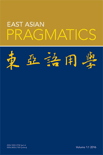
East Asian Pragmatics
Unveiling Linguistic Richness in Cultural ContextsEast Asian Pragmatics, published by EQUINOX PUBLISHING LTD, serves as a critical platform for interdisciplinary research in the fields of Communication, Cultural Studies, and Linguistics. With an ISSN of 2055-7752 and an E-ISSN of 2055-7760, this journal has established significant relevance, evidenced by its Q2 and Q3 classifications in critical academic categories for 2023. Spanning the years from 2018 to 2024, East Asian Pragmatics aims to advance understanding of pragmatics within the context of East Asia, facilitating scholarly discourse that bridges linguistic insights with cultural phenomena. Its Scopus ranking highlights its growing importance, particularly in cultural studies and linguistics where it ranks in the top half of its categories. Researchers, professionals, and students are encouraged to explore the wealth of knowledge and unique perspectives presented in its articles, contributing to the vibrant tapestry of East Asian linguistic and cultural studies.
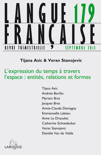
LANGUE FRANCAISE
Illuminating the Pathways of French Linguistic ThoughtLANGUE FRANCAISE, published by LAROUSSE, stands as a premier journal in the realm of linguistics and language studies, boasting an impressive Q1 quartile rating in the 2023 Linguistics and Language category. With its international reputation anchored in France, this journal presents critical research and discussions that advance our understanding of the French language, its structures, usage, and evolution. Although not an open-access publication, LANGUE FRANCAISE is indexed with an ISSN of 0023-8368 and an E-ISSN of 1957-7982, reflecting its scholarly credibility and impact, including Scopus rankings that place it competitively in the fields of arts and humanities as well as social sciences. This journal serves as an essential resource for researchers, practitioners, and students aiming to deepen their knowledge and engage in scholarly debates that shape contemporary linguistic thought. The journal's commitment to high-quality research continues to foster an enriching academic environment and contribute to the dynamic discourse surrounding language and linguistics.
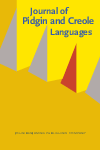
JOURNAL OF PIDGIN AND CREOLE LANGUAGES
Illuminating the Intersection of Language and SocietyJOURNAL OF PIDGIN AND CREOLE LANGUAGES, published by John Benjamins Publishing Co, is a leading international journal dedicated to the study of pidgin and creole languages, offering a unique platform for interdisciplinary research within the fields of linguistics and language studies. With an impressive impact factor reflected in its 2023 Scopus rankings—placing it in the Q2 category for both Linguistics and Language—this journal has established itself as an essential resource for academics and practitioners alike. Covering a broad temporal scope from 1986 to 2024, it promotes innovative research that advances the understanding of language evolution, socio-linguistics, and cultural dynamics. The journal’s focus on both theoretical and practical perspectives makes it particularly valuable for researchers, professionals, and students interested in the complexities of language and identity. Although it does not currently offer Open Access, its commitment to quality scholarship ensures that each issue presents cutting-edge research and critical insights into the world of pidgins and creoles.
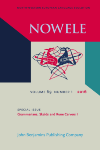
NOWELE-North-Western European Language Evolution
Charting the Course of Linguistic TransformationsNOWELE-North-Western European Language Evolution, published by John Benjamins Publishing Co, serves as a vital platform for researchers and scholars interested in the evolution and dynamics of North-Western European languages. With an ISSN of 0108-8416 and an E-ISSN of 2212-9715, this journal has been contributing to the field of linguistics since its inception in 1983, with ongoing publications until 2024. Indexed in Scopus and classified in the Q3 category for Linguistics and Language, NOWELE is recognized for its rigorous academic standards and diverse contributions, ranking #485 out of 1088 in the Arts and Humanities category, and #566 out of 1167 in Social Sciences. The journal fosters an open dialogue within the linguistic community, presenting innovative research findings and theoretical advancements. Researchers, professionals, and students alike benefit from its systematic exploration of language evolution in the context of a rapidly changing global linguistic landscape.
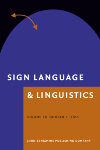
Sign Language & Linguistics
Pioneering Insights into Sign Language and SocietySign Language & Linguistics is an esteemed academic journal published by John Benjamins Publishing Co, dedicated to advancing the field of sign language studies and linguistics. With an ISSN of 1387-9316 and an E-ISSN of 1569-996X, this journal has earned a prominent place in the linguistic community, achieving a Q1 ranking in both the Linguistics and Language category, and standing out within the Scopus rankings, placing in the 77th percentile among the Arts and Humanities and 75th percentile in the Social Sciences categories. Sign Language & Linguistics spans over two decades of research, offering comprehensive insights and analyses from 1998 to 2024, promoting high-quality scholarly communication. Aimed at researchers, professionals, and students alike, this journal is essential for those exploring the intersection of sign languages, linguistics, and cultural studies, facilitating progressive discourse and fostering an understanding of this vital mode of human communication.

LINGUISTIQUE
Bridging Gaps in Linguistic UnderstandingLINGUISTIQUE, an esteemed journal published by PRESSES UNIV FRANCE, serves as a vital platform for scholarly discourse in the fields of linguistics and language studies. With its ISSN 0075-966X and E-ISSN 2101-0234, this French journal has been a significant contributor to the understanding of linguistic phenomena since its inception in 2004, and it continues its journey through to 2024. Although currently categorized in the Q4 quartile for both Arts and Humanities (miscellaneous) and Linguistics and Language, its commitment to publishing quality research encourages a diverse range of articles, reviews, and innovative studies. Positioned in the 32nd and 29th percentiles for its respective fields according to Scopus rankings, LINGUISTIQUE is dedicated to advancing knowledge and stimulating engagement among researchers, professionals, and students alike. While it does not offer open access, the journal remains an essential resource for those who seek to deepen their understanding of linguistic principles in a global context, facilitating a richer discourse that connects theory with practice.

Language and Linguistics
Shaping the Future of Linguistics, One Article at a TimeLanguage and Linguistics is a leading academic journal published by ACAD SINICA, INST LINGUISTICS, based in Taiwan. Established in 2008, this journal has rapidly gained recognition within the field of linguistics, achieving a commendable ranking of Q2 in the 2023 category quartiles and holding positions in the top percentiles of Scopus rankings for both Arts and Humanities and Social Sciences. With an ISSN of 1606-822X and an E-ISSN of 2309-5067, the journal aims to foster the development of linguistics research by providing a platform for the dissemination of innovative and interdisciplinary studies. While it currently operates on a traditional subscription model, its significant contribution to the advancement of linguistic theory and its applications makes it an invaluable resource for researchers, professionals, and students alike. Spanning converged years from 2008 to 2024, Language and Linguistics continues to shape the dialogue in understanding language phenomena and encourages submissions that push the boundaries of current linguistic knowledge.